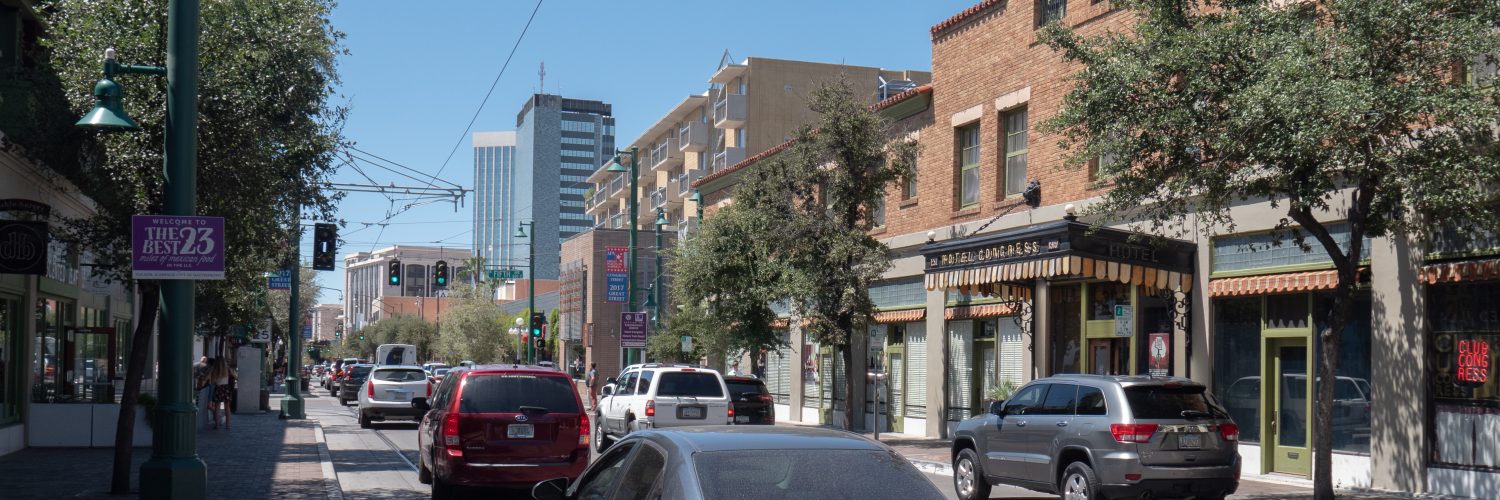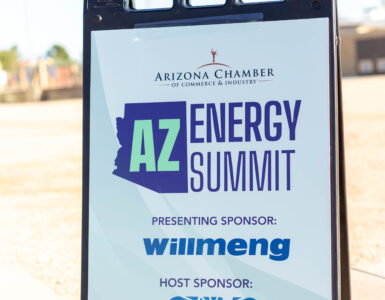The SCALE UP Program is a Tucson-based initiative to help local businesses become more sustainable, saving them money on utilities, providing educational resources and offering financial incentives while reducing energy use, water consumption, waste and emissions.
The program was launched by the Local First Arizona Foundation, the sister organization to nonprofit Local First Arizona (LFA) focused on creating strong, self-sufficient local economies, in partnership with the Tucson 2030 District, a public-private nonprofit collaborative dedicated to creating a high-efficiency building district in Tucson.
“When it comes down to it, the Local First Arizona Foundation is about creating a better economy that benefits all Arizonans,” said CJ Agbannawag, program manager for SCALE UP.
“We believe that it’s important that, when we’re talking about sustainable economies, we also need to be considering what it means to have a sustainable environment and a sustainable community,” he said. “And we realize that business ownership and the way we run a business has a big impact on the environment and on your community.”
SCALE UP — Sustainable Communities Accessing Lending and Expertise Upon Performance — launched in 2018 as a pilot program for Tucson, funded by the Arizona Office of Grants and Federal Resources.
“We wanted to put a twist on the traditional type of energy efficiency workshops and water efficiency workshops to see if [businesses] can have better follow-through… and actually make these bigger implementations and investments in their buildings so they can be more sustainable,” Agbannawag said.
In the pilot program, 11 locally-owned Tucson businesses went through a six-workshop series covering topics including energy efficiency, water conservation, waste reduction, transportation efficiency, benchmarking and Green Teams, a volunteer effort by LFA to connect citizens with businesses and provide educational opportunities to the community.
“Each of the six workshops, we pulled in community experts, because there’s already a lot of these great resources out there in your community,” Agbannawag said. “We had slides that facilitators presented on with information that was aggregated from the community and also from the EPA (Environmental Protection Agency), and then we provided a workbook with quick lists of resources for all the different topics.”
The workshops provided checklists that businesses could use to benchmark (evaluate) their sustainability practices and track their progress. The program also offered an incentive package of resources, including energy rebates.
“There were actually some custom incentives as well,” Agbannawag said. “For example, Tugo Bike Share here in Tucson, they offered a custom rate for businesses. If they saved 10 percent on their efficiency, they could get a 10 percent discount on their corporate membership through the bike share program.”
The program’s purpose is to educate business owners, offer perspective on sustainability issues and create understanding about important questions: Where does the energy come from when you turn the lights on? Where does your water come from in Tucson?
“We wanted businesses to take ownership for these sustainability plans,” Agbannawag said. “There are a lot of auditing-type services out there where someone will come in and do an energy audit for your business, but then those plans just kind of sit on a shelf.”
SCALE UP encourages participants to create a sustainability plan and follow through on it, using resources and advice from industry professionals, government officials and utility experts. The program also lays out all the different incentives and rebates utilities offer, making it easier for business owners to sift through options.
“At the end of each topic, businesses had to benchmark their buildings and benchmark their business practices,” Agbannawag said. “Things like, ‘How many LED light bulbs do you have? How many gallons-per-flush are your toilets?’”
Businesses also had to benchmark their buildings using the Energy Star Portfolio Manager online tool, tracking the progress of energy efficiency improvements and comparing past and current usage.
“The pilot was just in Tucson, so it worked with Tucson Water, Tucson Electric Power and the City of Tucson and all the different municipalities down here to get the information specific to the area,” Agbannawag said. “But the plan is to eventually expand it to the rest of the state.”
The Arizona chapter of Physicians for Social Responsibility, a national environmental health advocacy group, was a major partner, he said.
“We also worked with the Pima Association of Governments, because they have a lot of great transportation resources in Pima County, including the folks that run our local bus system and streetcar system, from Sun Tran,” Agbannawag said. “We also had other local nonprofits, like Watershed Management Group, which is a local water coalition here in town; they participated. Technicians for Sustainability was a partner as well; they’re a local solar installer. So we had a pretty broad range of partners that assisted in this program.”
Ultimately, the LFA Foundation hopes the program makes business owners more aware of what is going on in their environment and their community, as well as the impact their businesses can have, Agbannawag said.
“Secondly, we want to help these businesses to reduce their utility spending so they actually have more money freed up to invest in their building in other ways or to invest in their company in other ways, so that they can be more environmentally-friendly and have better economic performance,” he said.
Finally, participants were given exclusive access to a revolving loan fund from the nonprofit Community Investment Corporation (CIC) in Tucson, allowing businesses to take out low-interest loans for sustainability projects. The loans were matched up to 20 percent by a grant from a CIC investor.
The pilot program businesses saw “a pretty big spectrum of improvements across the board,” Agbannawag said.
For example, Pop-Cycle, a sustainability-focused bicycle shop, operates out of a historic building in Tucson that the company believed to be inherently inefficient, Agbannawag said. But after completing the SCALE UP program, Pop-Cycle saw the building’s lowest energy bill in 20 years, he said.
Right now, SCALE UP is in a planning period, hoping to receive assistance from the state and the City of Tucson to continue the program.
“We’re taking what we’ve learned, we’re identifying other partners, so that way when we do relaunch the program we can pretty quickly expand it,” Agbannawag said.
SCALE UP wants to take a cohort of businesses through the program every quarter — four cohorts per year — and complete at least two more sessions before expanding to Phoenix and elsewhere in the state, he said.
Climate change and water shortages will create new financial challenges for local businesses, and learning to be more sustainable is a smart way to prepare for that and offset the economic impact, Agbannawag said. Consumers should be aware, too, he said.
“At Local First, we tell people all the time to vote with your dollar, to support the local businesses, because they have the decision-making power here in our state, and we want to keep our money here to support our tax base in Arizona,” he said.
“If you’re a consumer that wants to be more sustainable, find the businesses — like the ones that went through SCALE UP — that are supporting green projects and sustainability projects, and support them as well, and let them know that they’re doing a good job.”
***
Business owners can email CJ Agbannawag for more information about upcoming SCALE UP workshops or to add themselves to the contact list for future cohorts.
















Add comment